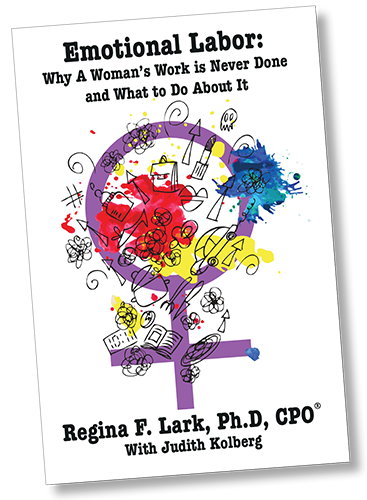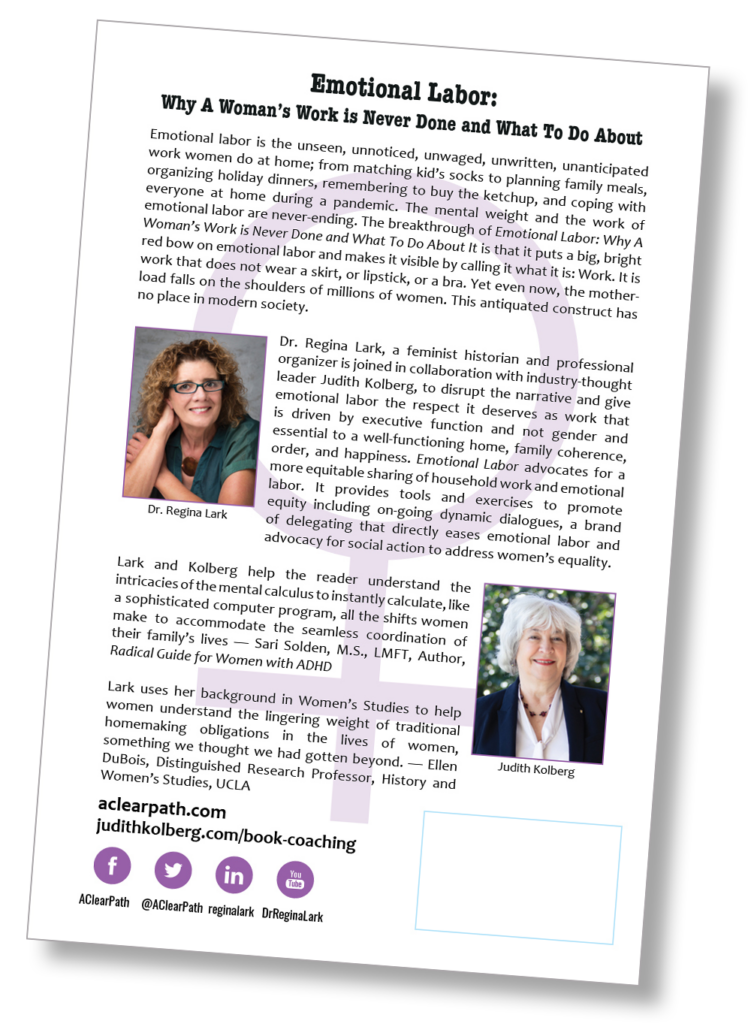So many women are feeling Beleaguered, and Bothered, and Bewildered by the volume of work that is attached to the name “Women’s Work”.

Foreword by Sari Solden, M.S., LMFT
The new book by Regina Lark and Judith Kolberg Emotional Labor: Why A Woman’s Work is Never Done and What To Do About It, brings into bold relief a concept that may come as a surprise to many. Although it is 2021, there is a deeply held practice and belief by women that despite advances in “sharing the household tasks” with partners, they still carry the largest share of what the authors call the emotional labor for the family. Even while men increasingly share, help, or take on many of the tasks of childcare, home care, laundry and cooking, women of all ages very often continue to carry the mental and emotional work load and feelings of responsibility for the smooth operation of the household and the well-being of its members.
This comes as no surprise to psychotherapists such as myself, who hear daily shame-filled “confessions” from women with organizational challenges. The “unwritten job description” that I first wrote about in 1995, outlined the internalized gender role expectations that lead women to feel hyper-responsible for tending to the “niceties of life”; everything from remembering their mother- in-law’s birthday, their sister’s anniversary, sending flowers for sympathy, making sure the children have regular doctor and dentist appointments, writing thank you notes, planning parties, problem solving, attending to hurt feelings, teacher conferences, and on and on, and, of course, as the authors describe so colorfully, making sure that no one goes without the “f—ing ketchup! “
In my work over the last thirty years with women with ADHD, I have seen how the challenges with executive function (the management functions of the brain that keep our daily lives coordinated and smooth running) painfully collide with these gender role expectations, resulting in a toxic mix of clutter and shame that deeply affect their core sense of self and often the power dynamic in their intimate relationships.

In their new book, Lark and Kolberg, two outstanding organizers/feminists who have helped revolutionize the world of women with chronic and severe organizational challenges, now expand our perspective to help us see beyond women with executive function difficulties. They shine a light on how most women carry an enormous burden as a result of the mental gymnastics involved in tracking the needs of each family member in order to prevent both minor inconveniences and larger disasters.
This precision navigation by women often occurs below the radar, their automatic seamless coordination of their family’s lives going largely unnoticed by others. The price paid by women for this mental and emotional labor seeps into the pores of their everyday lives and saps their emotional reserves, often leaving little time for their own self-care.
The kind of system change needed to impact this dynamic will require ongoing direct, heart- to-heart talks within families and with partners. However, this process starts with women having an in-depth and continuing talk with themselves and with each other about the multi-generational internalized messages that work to maintain this system. Women can’t be the engine that keeps everyone else’s lives running smoothly, often at the expense of their own.
The authors illustrate how household management goes way beyond mere tasks and errands. They help the reader understand the intricacies of the constant mental calculus; the ability to instantly calculate like a sophisticated computer program all the shifts that need to happen to accommodate the whole system in an effort to prevent even minor negative outcomes. Women play the role of understudy for every person’s part in the family drama, ready to step in at a moment’s notice.
Perhaps if we let go of some of the “emotional labor,” not only would we lessen our own mental load, but other members of the family just might gain more confidence, competence, and the ability to tolerate a little more discomfort (after all, it’s often only the “f-ing ketchup”).
Booksellers, request password from Regina@reginalark.com
Judith Kolberg, From Book Coaching to Collaboration

Dr. Regina Lark is a professional organizer and feminist historian. Several years ago, the concept of ‘emotional labor’ turned on a lightbulb in her mind that excited her greatly. The emotional labor concept integrated Regina’s background in feminist history, professional organizing, and social change. She knew she wanted to write a book. She had lots of notes, clear ideas, and tons of research material but whenever she sat down to write, other priorities won out, or she just could not quite get the right words out of her head. “I realized I should hire a book coach” Regina concluded.
Simply hiring a book coach immediately gives you the focus needed to write a book. I coached Regina through explicating her central concept and key themes. We established a process for working together, stuck to it religiously, and the book began to unfold. Back and forth the drafts went between us. What began as coaching an author through the writing, developed into a fuller collaboration. Soon I could write whole chapters in Regina’s voice and could even add original content.
The resulting 40,000-word book, Emotional Labor: Why A Woman’s Work is Never Done and What to do About It, has attracted significant ‘buzz’ including praise from subject matter experts in emotional labor; leaders in the field of feminist history, activists at the forefront of women’s empowerment, and outstanding professional organizers. Regina has positioned herself as an authority on the topic securing presentation bookings and media events.
Every author’s need is different. And, no book coach can tell you your book will be a best-seller, but I can guarantee you a superbly interesting, high quality book you can be proud of. See judithkolberg.com for more book coaching information or contact me at judith@judithkolberg.com or 404-231-6172.


That’s me, Judith Kolberg, book coach to Regina Lark with our book Emotional Labor: Why a Woman’s Work is Never Done and What To Do About It. It’s available now at Charis Books & More, 184 S. Candler Street, Decatur, GA 30030 and at Eagle Eye Book Shop, 2076 N. Decatur Rd, Decatur, GA 30033.

Relationship Miracle Worker
relationshipmiracleworker.com
Book Review
by Merle M. Singer
EMOTIONAL LABOR: Why a Woman’s Work is Never Done and What to Do About it
by Regina F. Lark, PhD, CPO
Regina F Lark, Phd, did a highly researched lavishly attributed mega research book. You might think she is some kind of professor or PhD type. Oh, she is.
From my perspective, as a married woman with grown children, I relate to a lot and am an outlier to other parts. I’ve managed to divide the physical labor reasonably, but that invisible, emotional labor still rules my days, even as the kids are gone and across the country, birthday cards and video calls to the great grandkids fall on me. I love it, but I’d sure love emotional support, or at least some notice of its value. What has changed is that it’s my grandson on the other end who organizes our visits.
In terms of “what to do about it”, I honed in on the idea of the Marshall Plan for Moms. Effective to remind us of the Marshall Plan in 1948 and how it “poured billions of dollars into the successful effort to rebuild infrastructure, cities, and industries for our Allies after WWII.” What commitment, what power, what success. If we used that model to solve our homework and make visible our emotional labor it would truly transform our society. Frankly, I think that would be too much too fast for many. Let’s just start with a beautifully told story of emotional labor and how woman’s work is never done and what to do about it. Oh, that’s been done and with professional research and raw emotion exposed. Very Powerful. Thank you Regina Lark and Judith Kolberg.
Booksellers, request password from Regina@reginalark.com

